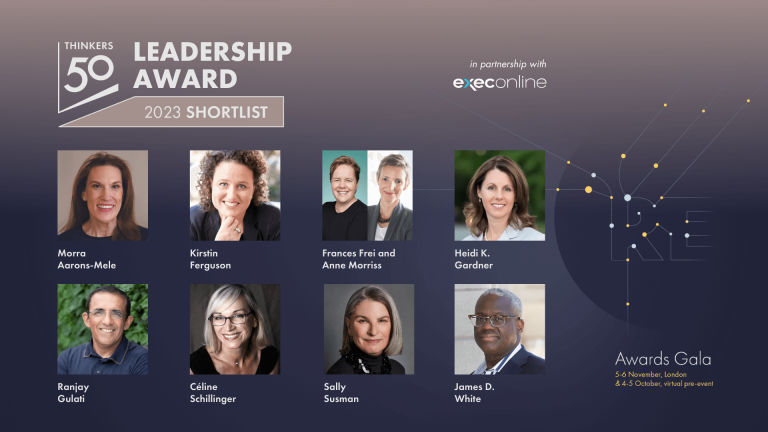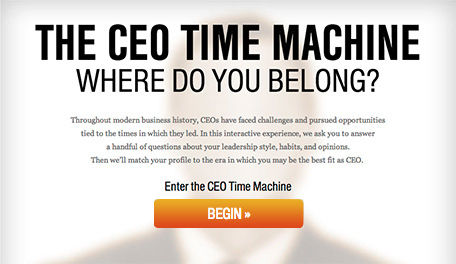

by Ken Favaro, Per-Ola Karlsson, and Gary L. Neilson
By 2040 we estimate that women will represent some 30 percent of the incoming class of the top 2,500 global CEOs. And that proportion will only increase over time.
To punctuate the rise of women leaders and to help personify the challenges CEOs will encounter by the middle of this century, we have envisioned a prototypical chief executive of 2040. We call her Melissa. She was born in the 1980s or ’90s; in 2014, she is likely in graduate school or the early stages of her career.

What might Melissa’s path to the C-suite look like?
In aggregate, Melissa’s education and early-career experiences are laying the groundwork for a view of the world and of work that is quite distinct from that of those occupying the corner office in 2014. She has probably had experiences leading teams, and working with virtual teams. She has spent time volunteering, traveling, or working in at least one place that is dramatically different from her home region.
Because Melissa is curious and innovative, she may have invented something—an app or a drip-drainage system. Or she might have developed a passion for nanotechnology, advanced robotics, or new energy and transportation ideas. She may well be fluent in more than one foreign language, and conversant in a programming language or two.
More than likely, Melissa will be a graduate of one of the many MBA programs that have adapted their pedagogy to appreciate, emphasize, and develop women’s typically more empathetic style of leadership. In addition to the wide array of experiences female leaders bring to bear on their position, a wealth of evidence suggests that they manage people differently than their grandfathers did. Given this, the office of tomorrow may well be less authoritarian, and more collaborative and balanced, than the office of today.
Steeped in technology use from her early years, Melissa will be more comfortable with the fact that IT is deeply integrated into every experience than most present-day CEOs are, and she will be keenly interested in potential disruptions brought on by sudden changes in technology. She will understand how technology enables a reduction of scale and lowers barriers to entry—for both her own company’s entry into new markets and competitors’ entry into markets her firm dominates. Human-centered design will be a likely interest, and she will be on top of the latest waves of consumer technology and how they are shaping the way she engages with her customers. And she will learn how to pull insights from information in a more rapid and cohesive way than is possible today—even for those on the front lines of “big data.”
Melissa will lead an organization that is yet another significant grade flatter than anything we see today, because governance, regulatory compliance, and quality processes will become more automated and built into the everyday workings of the firm. Better decision-support systems, and a greater focus on company-wide capabilities, will make it much easier for information to reach Melissa than is the case for most of her peers today. It will also allow the team member closest to a given situation to deal with it directly. Employees at all levels will be more likely to know what to do, even in unanticipated situations.
For her company to be successful, Melissa will need to be more entrepreneurial, financially astute, and risk savvy than her predecessors. Responsibility to all stakeholders will be an ever more important part of the corporate profile. Regardless of whether existing regulations attempt to prevent her company from doing the wrong thing, Melissa will understand that it’s too expensive to risk running afoul of employees, customers, suppliers, investors, NGOs, and social and environmental groups. Melissa will be managing all these relationships without the benefit of a chairman or a board—at least not as we know them today. Given the direct nature of her relationship with investors, in particular, and the high levels of accountability they will demand, the traditional governance structures of the corporation will have outlived their usefulness.
Melissa will possess extraordinary listening, speaking, writing, and engagement abilities. The latest forms of social media, which will be the immediate tool of all constituencies regardless of age, will put Melissa in direct connection not just with investors but with the range of other stakeholders who want to hold management accountable—whether she likes it or not.
We’ve attempted to paint a picture of the CEO’s future role—much of it admittedly speculative, but based on our long and deep understanding of the position and the underlying fundamentals driving change. Leadership has experienced an amazing evolution, and the road ahead is going to be less and less predictable. It will require every ounce of flexibility, emotional intelligence, and creative thinking that executives possess.
This is an abridged piece from strategy+business magazine, excerpted by permission of strategy+business. To learn more, check out the article The Lives and Times of the CEO. Copyright ©2014 PwC. All rights reserved.

Thinkers50 Limited
The Studio
Highfield Lane
Wargrave RG10 8PZ
United Kingdom

Thinkers50 Limited
The Studio
Highfield Lane
Wargrave RG10 8PZ
United Kingdom

| Cookie | Duration | Description |
|---|---|---|
| LANG | 9 hours | Linkedin set this cookie to set user's preferred language. |
| nsid | session | This cookie is set by the provider PayPal to enable the PayPal payment service in the website. |
| sp_landing | 1 day | The sp_landing is set by Spotify to implement audio content from Spotify on the website and also registers information on user interaction related to the audio content. |
| sp_t | 1 year | The sp_t cookie is set by Spotify to implement audio content from Spotify on the website and also registers information on user interaction related to the audio content. |
| tsrce | 3 days | PayPal sets this cookie to enable the PayPal payment service in the website. |
| x-pp-s | session | PayPal sets this cookie to process payments on the site. |
| __cf_bm | 30 minutes | This cookie, set by Cloudflare, is used to support Cloudflare Bot Management. |
| Cookie | Duration | Description |
|---|---|---|
| l7_az | 30 minutes | This cookie is necessary for the PayPal login-function on the website. |
| Cookie | Duration | Description |
|---|---|---|
| CONSENT | 2 years | YouTube sets this cookie via embedded youtube-videos and registers anonymous statistical data. |
| _ga | 2 years | The _ga cookie, installed by Google Analytics, calculates visitor, session and campaign data and also keeps track of site usage for the site's analytics report. The cookie stores information anonymously and assigns a randomly generated number to recognize unique visitors. |
| _gat_gtag_UA_10408481_1 | 1 minute | Set by Google to distinguish users. |
| _ga_ZP8HQ8RZXS | 2 years | This cookie is installed by Google Analytics. |
| _gid | 1 day | Installed by Google Analytics, _gid cookie stores information on how visitors use a website, while also creating an analytics report of the website's performance. Some of the data that are collected include the number of visitors, their source, and the pages they visit anonymously. |
| Cookie | Duration | Description |
|---|---|---|
| NID | 6 months | NID cookie, set by Google, is used for advertising purposes; to limit the number of times the user sees an ad, to mute unwanted ads, and to measure the effectiveness of ads. |
| test_cookie | 15 minutes | The test_cookie is set by doubleclick.net and is used to determine if the user's browser supports cookies. |
| VISITOR_INFO1_LIVE | 5 months 27 days | A cookie set by YouTube to measure bandwidth that determines whether the user gets the new or old player interface. |
| YSC | session | YSC cookie is set by Youtube and is used to track the views of embedded videos on Youtube pages. |
| yt-remote-connected-devices | never | YouTube sets this cookie to store the video preferences of the user using embedded YouTube video. |
| yt-remote-device-id | never | YouTube sets this cookie to store the video preferences of the user using embedded YouTube video. |
| yt.innertube::nextId | never | This cookie, set by YouTube, registers a unique ID to store data on what videos from YouTube the user has seen. |
| yt.innertube::requests | never | This cookie, set by YouTube, registers a unique ID to store data on what videos from YouTube the user has seen. |
| Cookie | Duration | Description |
|---|---|---|
| DEVICE_INFO | 5 months 27 days | No description |
| loglevel | never | No description available. |
| m | 2 years | No description available. |
Thinkers50 Limited has updated its Privacy Policy on 28 March 2024 with several amendments and additions to the previous version, to fully incorporate to the text information required by current applicable date protection regulation. Processing of the personal data of Thinkers50’s customers, potential customers and other stakeholders has not been changed essentially, but the texts have been clarified and amended to give more detailed information of the processing activities.